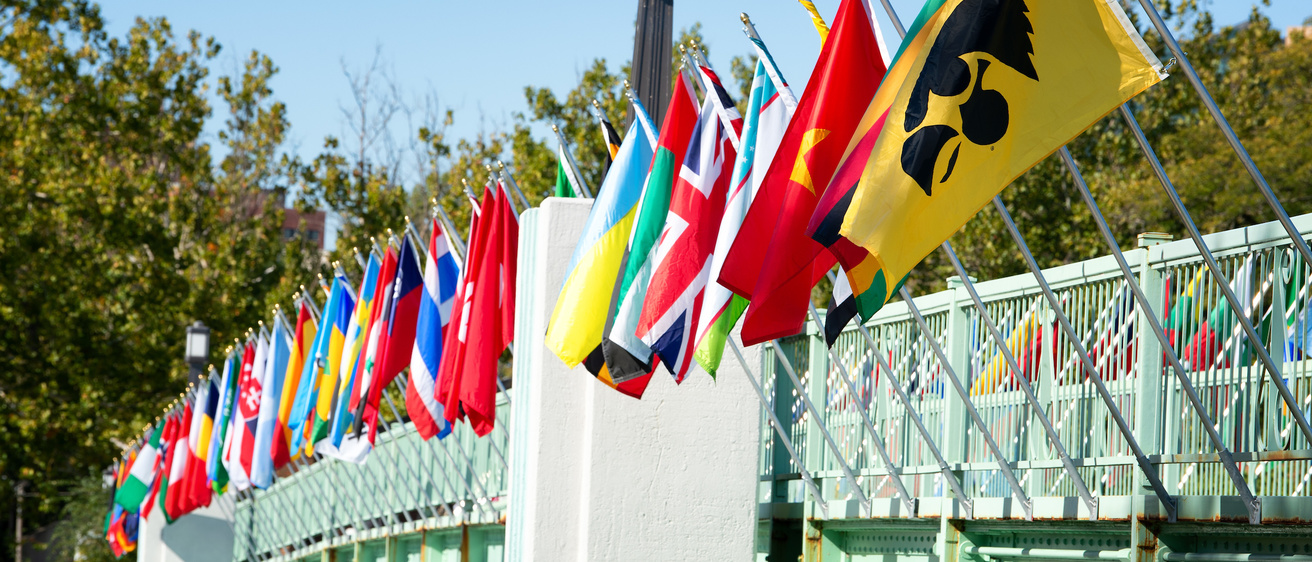The major in international relations focuses on economic relations between states, a crucial area of study in today's globalized world. Students are introduced to the politics of foreign countries. They develop an understanding of how countries interact and acquire a deep appreciation for the root causes of problems that transcend national boundaries.
International interactions and globalization have never been more extensive, making international relations a critical area of study and the major uniquely valuable to students with a wide array of interests.
Students graduating with a degree in international relations have the skills and knowledge to grasp international events from theoretical, empirical, and historical perspectives. In addition to gaining skills and knowledge with broad applicability, each major gains an in-depth understanding of a particular aspect of international relations.
As an international relations student, you'll be taught by leading scholars in political science, history, geography, and other fields. You'll be able to choose from four areas of emphasis to meet your interests, and you'll benefit from a variety of opportunities to engage actively with contemporary world affairs, including by working directly with faculty members on international research.
Distinguished alumni with careers in diplomacy, international law or business and other related fields frequently teach courses and give guest lectures. Opportunities abound for Iowa students to attend talks by major international figures in virtually every field.
Students in this major need to meet the requirements for admission to the College of Liberal Arts and Sciences.
Information

First-Year

Transfer

International
Within six months of graduating, 96 percent of Iowa graduates are employed, continuing education, or not seeking work. Our Pomerantz Career Center offers multiple resources to help students find internships and jobs.
A major in international relations is an excellent choice for any student considering a career in either the public or private sector, including the diplomatic service, intelligence organizations, multinational corporations, non-governmental organizations, international organizations, think tanks, public health agencies, the media, and numerous other professions. Graduates are well-prepared to pursue graduate or professional degrees.
In addition to more than 600 student organizations, Iowa students choose from more than 100 study abroad programs and multiple undergraduate research opportunities.
International relations majors are particularly encouraged to complete some of their requirements by researching Study Abroad Programs. Iowa students can take advantage of numerous programs related to each of the major’s emphasis areas in all world areas. They should contact the International Programs Office early in their studies to begin selecting a program.
A wide array of internationally focused centers and programs at the university generates special events for students interested in international relations. They include the African Studies Program, the Global Health Studies Program, the European Studies Program, the Latin American Studies Program, the Center for Asian and Pacific Studies, the South Asian Studies Program, and the King Sejong Institute.
Internships
Internships related to international relations are readily available. Students are encouraged to serve as interns, particularly in government-related agencies. The Pomerantz Career Center has information about and connections with internship programs in Washington, D.C. and around the world.
The University of Iowa provides a variety of scholarships to eligible undergraduate students through the Iowa Scholarship Portal. Scholarships are available to first-year, transfer, and currently enrolled students. For additional details on scholarships for your program of study, check directly with the department or college.
The Office of Admissions, the Office of Student Financial Aid, and the departmental website are great resources for students seeking scholarships.
The major in international relations requires a minimum of 120 s.h., including at least 37 s.h. of work for the major. Students choose from five tracks and take a wide variety of courses in political science, history, geography, business, global health, and more. Students also must complete the College of Liberal Arts and Sciences GE CLAS Core.
All students take these courses:
- Introduction to International Relations
- International Conflict
- Politics of International Economics
- The West and the World: Modern, World Since 1945, The Modern World, or International Politics: The History of the Present
- Designing Political Research or Analyzing Political Data
- International Relations Senior Seminar
- Six courses in one of the following four emphasis areas:
- Conflict and Foreign Policy
- International Business and Economic Relations
- Regional Politics and Relationships
- Transnational Issues
Students in the BS program take additional courses in math and statistics as preparation for advanced study in the discipline.
To learn more about the major or minor and graduating with honors, see International Relations in the UI General Catalog.
Teaching Licensure
If you are interested in teaching, consult with your academic advisor to prepare to apply to the College of Education's Teacher Education Program.
